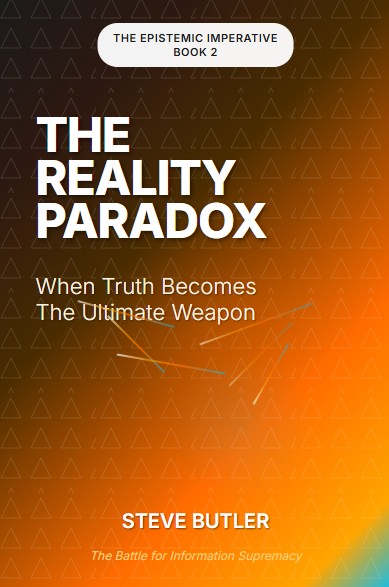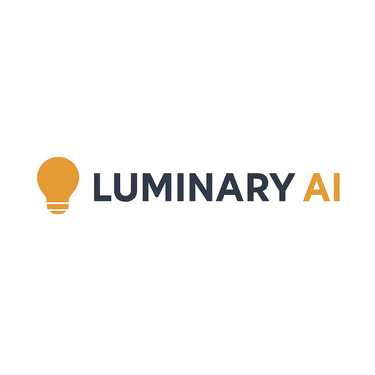
The Reality Paradox
When truth becomes the ultimate weapon
£24.00
In an age where AI can generate perfect lies faster than humans can detect them, truth itself has become the ultimate competitive advantage.
The crisis that makes AI safety essential.
While others debate AI capabilities, Steve Butler recognised the real threat: the complete breakdown of shared reality. As artificial intelligence makes convincing falsehoods indistinguishable from truth, the ability to verify what's real becomes more valuable than intelligence itself.
The paradox nobody's solving: The same AI systems that can generate breakthrough insights can also create perfect deceptions. The same tools that democratise knowledge also weaponise misinformation. The same technologies that promise human advancement threaten the information foundations upon which democracy, science, and economic prosperity depend.
The Reality Paradox is the second volume in Steve Butler's groundbreaking Epistemic Imperative trilogy, documenting the verification revolution already transforming how leading organisations distinguish truth from sophisticated fiction.
This isn't another warning about deepfakes and misinformation. This is the operational manual for building verification capabilities that transform information chaos into an unbeatable competitive advantage.
As founder of Luminary AI—the world's first fully AI-governed enterprise operating under systematic truth-seeking principles—Butler didn't just study the breakdown of epistemological foundations. He built the infrastructure to navigate it profitably.
The frameworks that win the verification war:
VERIFY Framework: Systematic approaches to validating information in real-time, turning fact-checking from defensive necessity into offensive capability.
SYNTHETIC Detection Systems: Advanced methodologies for identifying AI-generated content, from subtle textual patterns to sophisticated media manipulation.
CASCADE Analysis: Understanding how false information propagates and building immune responses that stop disinformation campaigns before they achieve critical mass.
FORTRESS Architecture: Creating organisational information security that protects decision-making processes from epistemic attacks while maintaining openness to legitimate insights.
Why traditional approaches fail: Current fact-checking systems operate at human speed while disinformation spreads at digital velocity. Content moderation focuses on obvious falsehoods, while sophisticated manipulation exploits cognitive biases. Verification services treat symptoms while the underlying epistemological crisis accelerates.
The competitive advantages of truth-seeking infrastructure: Organisations that can verify information faster than competitors can create sustainable market advantages. They make better decisions based on accurate data. They build stakeholder trust that rivals cannot match. They remain resilient while information warfare destroys less-prepared institutions.
For executives: Learn how verification capabilities create measurable business value while your competitors struggle with information anxiety and defensive reasoning.
For media professionals: Discover how truth-seeking frameworks transform journalism from reactive reporting to proactive reality construction.
For educators: Understand how epistemological constitutional frameworks prepare students for AI partnership rather than competition.
For citizens: Get the tools to navigate information warfare while building collaborative intelligence with AI systems designed for truth-seeking rather than engagement optimisation.
The stakes couldn't be higher. As AI-generated content floods information ecosystems, the organisations and individuals who master verification will secure positions that become impossible to dislodge. Those who don't will find themselves increasingly unable to distinguish signal from noise, insight from manipulation, and opportunity from threat.
This book documents what's working right now. Through operational experience running an AI-governed company, Butler provides frameworks tested under real-world conditions rather than theoretical speculation. The verification methodologies described here generate competitive advantages while others debate their feasibility.
Steve Butler spent decades developing expertise in complex systems and institutional governance before building the world's first post-industrial organisation operating on systematic truth-seeking principles. Through collaborative dialogue with Claude using the Neural Operating System that governs his company's board and strategic decisions, he's discovering breakthrough insights about information verification that transform competitive landscapes.
The information foundations of civilisation are shifting. The question isn't whether this transformation will accelerate—it's whether you'll build verification capabilities that turn epistemological chaos into strategic advantage or remain vulnerable to information manipulation that destroys decision-making quality.
The reality paradox has a solution: Build truth-seeking infrastructure while others hope existing systems somehow adapt.
The verification revolution is already underway. The competitive advantages are accruing to first movers. The immune systems against information warfare are being built by those who understand that truth itself is becoming the scarcest and most valuable resource.
Your information diet determines your competitive position. Your verification capabilities determine your institutional survival.
Will you master the reality paradox, or become its victim?
